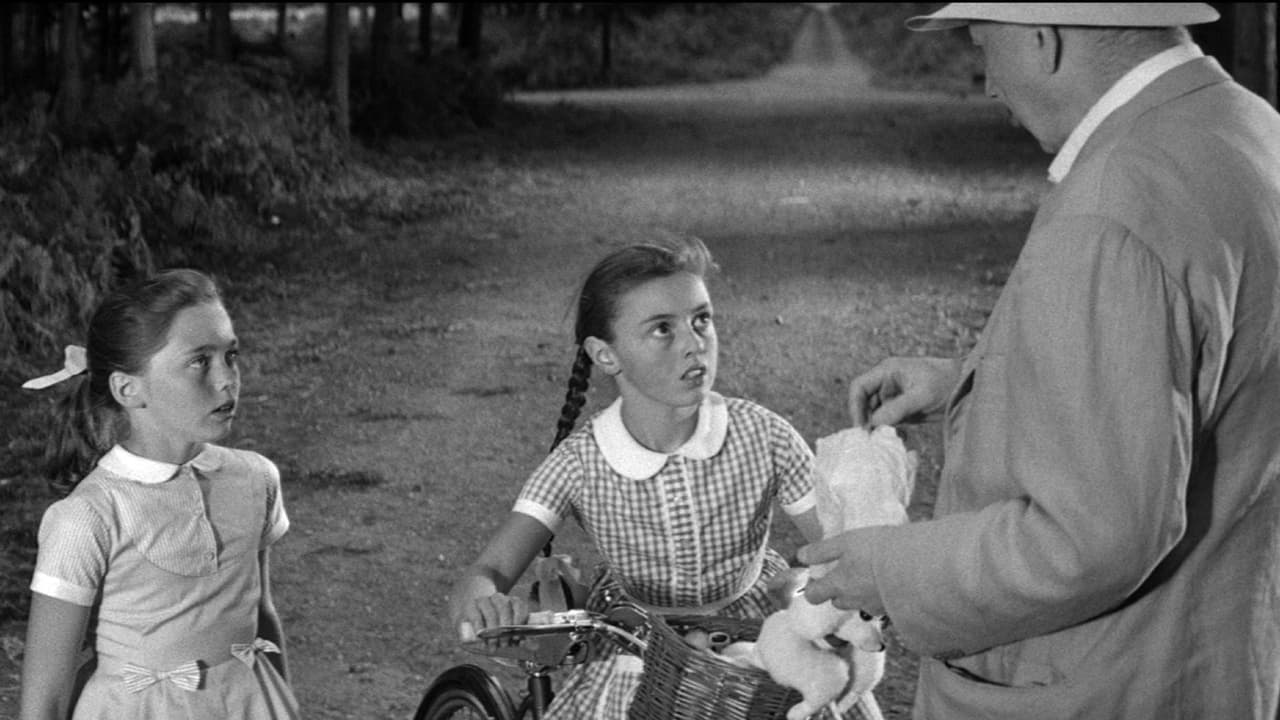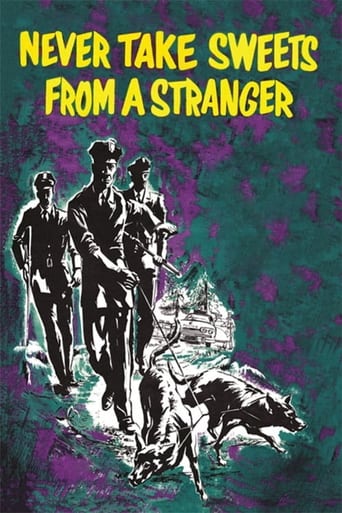

Really Surprised!
... View MoreNice effects though.
... View MoreCrappy film
... View MoreIt's hard to see any effort in the film. There's no comedy to speak of, no real drama and, worst of all.
... View MoreGive Hammer Studios credit for this one: they were ahead of the curve in exploring one of the most distasteful real-life horrors of them all. This isn't one of their period Gothics that tend towards the utterly fantastic. It's all too uncomfortably real. It REALLY hits a nerve, even if you, like this viewer, are not yet a parent. The corruption and despoiling of innocence is one of the worst things that we can imagine.Taking place in an Eastern Canadian village, but with a cast still largely consisting of British actors, it tells a tale (based on a play by Roger Garis) of happy married couple Peter and Sally Carter (Patrick Allen, Gwen Watford) who've come to this community where he will be a school principal. Very soon after arriving, their daughter Jean (Janina Faye) and her new friend Lucille (Frances Green) are victimized by elderly pervert Clarence Olderberry Sr. (Felix Aylmer, Polonius in Oliviers' "Hamlet"). The Carters find the path to justice a tricky one to navigate, since the Olderberry family retains such influence in the area.Marked by some very effective acting (Niall MacGinnis as the defence attorney, Alison Leggatt as Watfords' mother, Bill Nagy the old creeps' power-wielding son, Michael Gwynn as the prosecutor, and MacDonald Parke as the judge, et al.), "Never Take Sweets from a Stranger" plays out in a reasonably believable way, with all sorts of arguments being thrown about for how to proceed, and the facts of the matter. Olderberry Jr., understandably enough, has a hard time believing that his father could be such a monster, even though the old man DID spend time in a sanitarium.Exceptionally well shot in black & white widescreen by Freddie Francis (one of the greats in his field), this is overall a well made film and compellingly told story, which leads to positively chilling events.The material is handled is a respectably delicate manner by the filmmakers (including writer John Hunter and director Cyril Frankel), and fortunately does not tend towards the sensational, preferring to remain fairly low-key.Eight out of 10.
... View MoreJohn Hunter adapted Roger Garis' play "The Pony Cart" about the indecent procurement of a child by an adult. Story concerns a British family, recently relocated to a small Canadian village after the father has been hired as the school's new principal, who stir up a town-tempest after their little girl tells of an elderly man (from a prominent family) who asked that she and a school-friend take off their clothes before he would give them candy. The fact the girls approached and entered the old man's house of their own accord, and that he didn't physically touch or hurt them, gives the child's pragmatic grandmother reason to pause; however, the shaken mother wants immediate action, only to learn that the man in question has a history of behavioral issues that no one wants to touch. An unpopular title in the Hammer Films library, but not for the acting or writing (both of which are solid). The taboo subject matter was something neither the British nor US cinemas were prepared to tackle at the time, and the picture was unjustly forgotten. It has an interesting, complex scenario--with both sides weighed in court--that isn't at all dated, with only a bit of sensationalism rearing its head at the finale. Hammer Films never attempted anything of this sort again (because it failed to turn a profit), but the fact it isn't geared towards the mass market makes the film all the more worthwhile. **1/2 from ****
... View More"Never Take Sweets From a Stranger" is an odd anomaly. What I mean by this is that there aren't a whole lot of films like it back in its day--or even now. It tackles a topic that was never really talked about until recently--and hardly at all back in 1960--at that is the topic of pedophilia. Sadly, because of the American Production Code, such topics were pretty much forbidden for decades and it took the British (Hammer Films) to broach the topic. While the film is not perfect in talking about sexual abuse, it is awfully good considering so little was known about it at the time. I can say this with some confidence, as in my old job (before I went into teaching) was working with victims and perpetrators of sexual abuse--a job that nearly ate me up inside. I appreciate when a film makes a sincere effort to discuss sexual abuse--and "Never Take Sweets" should be commended.The film begins with a little girl being told by her little friend that there is a man nearby who will give them free candy. While nothing is shown and the child doesn't seem shaken up, she later mentions in passing about the old man who paid the two girls to dance around naked for him! Not surprisingly, the parents are concerned--and when they learn the whole story from their child, they are furious and push to have the man prosecuted. Interestingly, however, the old man comes from a VERY powerful local family and the community seems to have little interest in doing anything. To make things worse, the old man's son threatens the family if the prosecute. And, not surprisingly, the case is badly bungled and the old pervert gets away with it. Now this might sound like the entire film--but it's not. What follows is what makes the film so exceptional. The ending and how the film is handled from then on is terrifically handled--and I can't see how they could have made the ending any better--or any more tense and exciting. The bottom line is that this film is brilliantly done for 1960 and holds up well even today. The only negative, and for the time it was quite realistic, is that the sex offender was played a bit too broadly. He simply LOOKED like a dirty old man--and this is usually NOT the case with sexual abuse. But, on the other hand, it clearly shows how sex crimes can progress to even more serious ones if people stand back and allow it to go unpunished. A truly exceptional film--and one that is quite riveting.By the way, I do wonder why the film was set in Canada and the victim's family was British. Why didn't Hammer just set the film in the UK? Just wondering....
... View MoreVastly under-rated (no doubt due to it's lack of release and being regarded as just another Hammer Horror) it is yet another offering from that studio that shows just what crafted film-makers the team from Bray studios actually were.Director Cyril Frankel extracts first-rate performances from the leading performers, with Janina Faye worthy of special mention as the key victim in the saga.Production values are the usual high standard from the Hammer team of the late 50's - Early 60's, Bernard Robinson's production design triumphant transforming Pinewood's Black Park locations into a small Canadian town. Freddie Francis does his sterling filter work yet again, adding menace to the lakeside finale and offering more in monochrome than could have been achieved in colour.Considerably superior to most films that broach the subject matter and (although the copy I have seen is no better than average quality) it is hoped that the upcoming DVD release will restore the widescreen ratio thus allowing us to see it as it was intended.
... View More